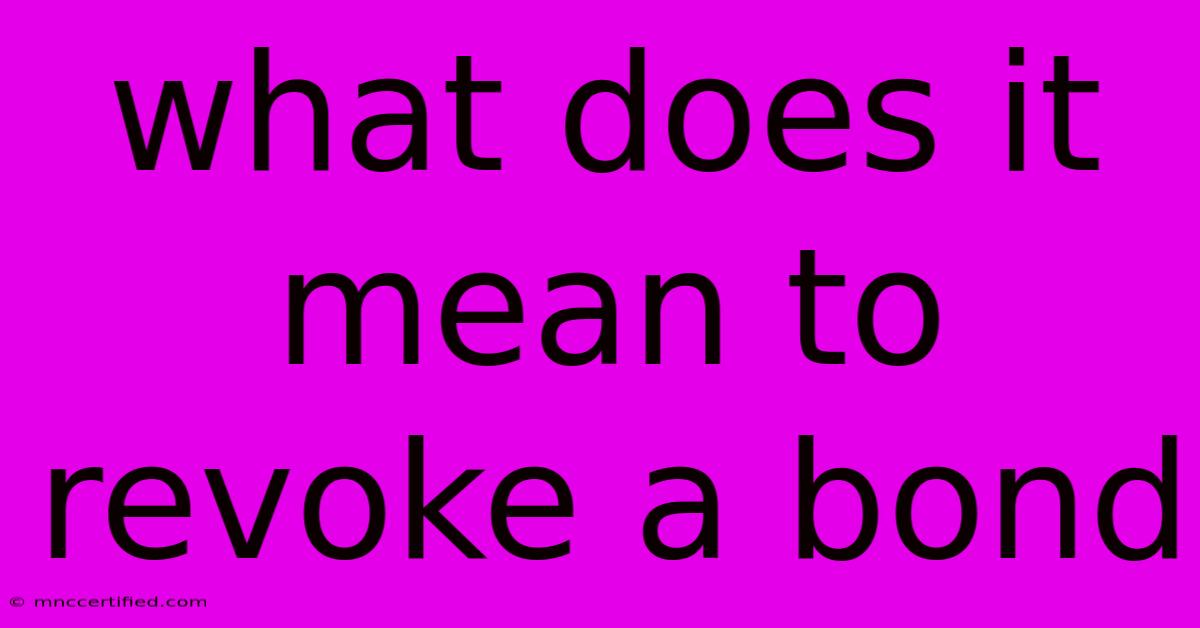What Does It Mean To Revoke A Bond

Table of Contents
What Does it Mean to Revoke a Bond? Understanding the Implications
The term "revoke a bond" can sound intimidating, particularly for those unfamiliar with legal terminology. But understanding what it means and its implications is crucial, especially if you're involved in situations where bonds are used. This article breaks down the concept of revoking a bond, clarifying its meaning and exploring its potential consequences.
Defining Bond Revocation
In simple terms, revoking a bond means cancelling or invalidating the bond, effectively nullifying its guarantee and removing any financial liability associated with it. Bonds are typically used as a form of financial security, acting as a guarantee for fulfilling obligations. Here are some common scenarios where bonds are used:
- Criminal Cases: Bonds are used to secure a defendant's release from jail pending trial. The bond ensures their appearance in court.
- Civil Cases: Bonds can be required to ensure the satisfaction of a judgment in favor of the plaintiff.
- Contractual Obligations: Bonds can be used to guarantee the performance of a contract. For instance, a construction company might provide a bond ensuring the project's completion.
Reasons for Bond Revocation
There are several reasons why a bond might be revoked, including:
- Failure to Appear: In criminal cases, if the defendant fails to appear in court as required, the bond can be revoked, and a warrant for their arrest will be issued.
- Breach of Contract: If the party responsible for fulfilling the obligations guaranteed by the bond breaches the contract, the bond can be revoked, and the surety (the entity that issued the bond) might be required to pay damages.
- Fraudulent Activity: If the bond was obtained through fraudulent means, it can be revoked.
- Non-payment: Failure to make payments on the bond can lead to its revocation.
- Non-compliance: If the terms and conditions of the bond are not met, it can be revoked.
Consequences of Bond Revocation
The consequences of bond revocation can be significant, depending on the specific context. They may include:
- Financial Liability: The surety who issued the bond may be held financially liable for the obligations that were not fulfilled.
- Legal Action: Bond revocation can trigger further legal proceedings, including arrest warrants, civil lawsuits, or other penalties.
- Reputational Damage: Bond revocation can damage the reputation of the individual or entity involved, making it difficult to secure future bonds.
Seeking Legal Advice
If you are facing a situation involving bond revocation, it is crucial to seek legal advice from an experienced attorney. They can help you understand your rights and options, navigate the legal processes, and potentially mitigate the consequences of bond revocation.
Understanding the Importance of Bonds
While bond revocation can have negative repercussions, it is important to remember that bonds are designed to protect both individuals and businesses. They provide assurance that obligations will be fulfilled and create accountability in various situations. Understanding the nuances of bonds and their revocation helps individuals and organizations navigate legal and financial complexities with greater clarity.

Thank you for visiting our website wich cover about What Does It Mean To Revoke A Bond. We hope the information provided has been useful to you. Feel free to contact us if you have any questions or need further assistance. See you next time and dont miss to bookmark.
Featured Posts
-
Franklin Templeton Technology Fund
Nov 15, 2024
-
Personalized Baseball Trading Cards
Nov 15, 2024
-
Nations League Round Up Italy And France Thursday Results
Nov 15, 2024
-
Nations Match France Israel Play To Draw
Nov 15, 2024
-
Glastonbury Tickets How To Secure Yours
Nov 15, 2024